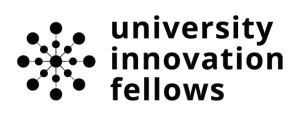Learning to Lead Change Together
University Innovation Fellows and faculty explored new ways to reimagine higher education during the Silicon Valley Meetup in March 2017.
by Laurie Moore
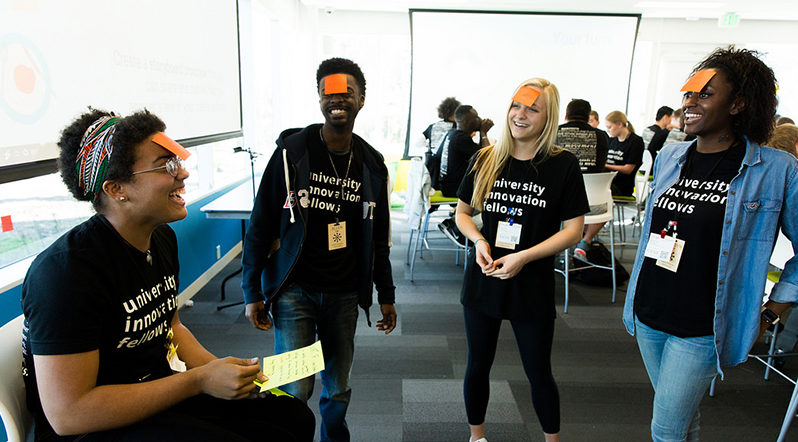
A team of Fellows brainstorming at Google during the Silicon Valley Meetup, March 2017. Photo by Patrick Beaudouin.
On a sunny afternoon in March at Stanford University, several hundred students designed experiments to test out new learning opportunities at their schools. An hour later, they listened, rapt, as Stephanie Santoso shared with them what it was like to help create the first ever White House Maker Faire. An hour after that, they were dancing to Bollywood music. They had breakthrough insights, forged new friendships with students from other countries, and listened as their peers shared their personal stories of struggle. This is the University Innovation Fellows Silicon Valley Meetup.
Nearly 300 Fellows and 30 faculty sponsors from 77 universities in 8 countries traveled to the San Francisco Bay Area on March 9-13, 2017, for the University Innovation Fellows (UIF) program’s signature event, the Silicon Valley Meetup. Attendees took part in immersive experiences at Stanford University’s d.school, Google, Microsoft and other Silicon Valley organizations.
The Meetup was the culmination of the 6-week, video conference-based online training for Fellows who joined the program in Fall 2016 and Spring 2017. This training helps Fellows understand their campus ecosystems and design educational opportunities for their peers. At the Meetup, Fellows took part in experiential workshops and exercises designed to inspire them, give them opportunities to collaborate with different schools, and provide them with tools to take action when they return to their home institutions. The activities focused on topics including movement building, innovation spaces, how to design and facilitate learning experiences, and new models for change in higher education.
The event kicked off on Thursday night with registration and dinner, where students sampled some of Silicon Valley’s best food trucks below strings of outdoor lights. During registration, attendees met their super-hero-themed teams and team leaders. These team leaders were 24 Fellows who acted as mentors to the participants, facilitated workshops, and gave short talks throughout the event.
On Friday morning, the Fellows hopped on charter buses and headed to their first Meetup location: Google. The group was hosted by Dr. Frederik Pferdt, Chief Innovation Evangelist. They took part in hands-on activities and learned about the innovation culture at Google, research on effective teams, and Google’s People Development group — a fresh take on the role of a human resources department.
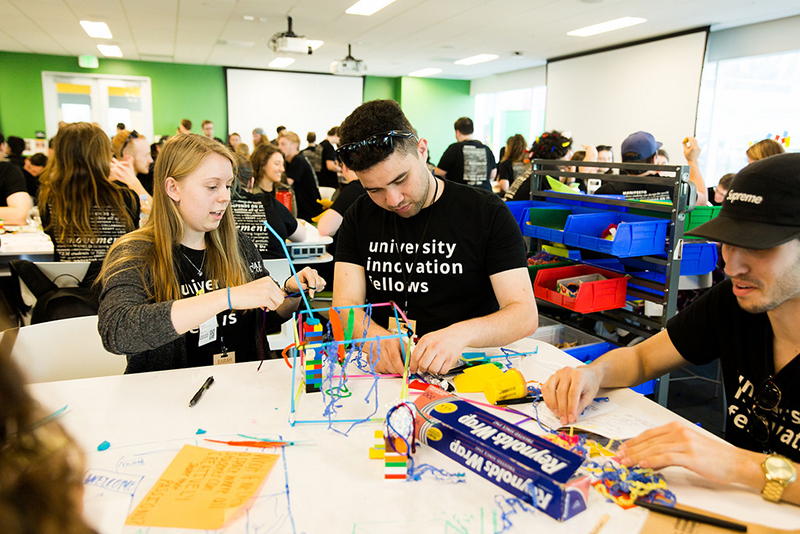
Fellows prototyping a game at Google. Photo by Patrick Beaudouin.
They also heard about the University Innovation Fellows program’s expansion into India from William Florance, Google’s Head of University Programs for Developer Training. Thanks to Google-funded expansion, 77 students from India have joined the program; 38 of those Fellows attended the Meetup. Three Fellows from CMR Institute of Technology in Bengaluru also shared their stories and experiences in India.
“Technology brings us into the future, but our creativity decides how this future will be shaped,” said Pferdt. “Every year, I am excited to be able to experience that contagious creativity the Fellows bring to Google and how they are tackling challenges as change agents at universities across the U.S. and now the world. It has been a great honor for me to host the Fellows for the last 5 years. Every time, I am confident that our future is in good hands.”
The Fellows visited the program’s home at Stanford University’s d.school for the first time on Saturday, March 11. They spent the day taking part in activities to help them reimagine learning, including sessions on storytelling and the ways space influences behavior. For one session, on how to leverage different thinking styles when working in teams, attendees wore t-shirts representing the colors of their default thinking styles. The result was a rainbow of students and faculty filling the d.school to the brim, demonstrating the diversity of approaches that they can take when working together.
Participants also heard from several speakers. Stanford professor Tom Byers hosted a panel of education and entrepreneurship thought leaders: Steve Blank, often referred to as the father of the Lean Startup movement; Errol Arkilic, who was instrumental in the creation of the National Science Foundation’s I-Corps (Innovation Corps); and Tom Kalil, Deputy Director for Technology and Innovation at the White House Office of Science and Technology Policy under President Obama.
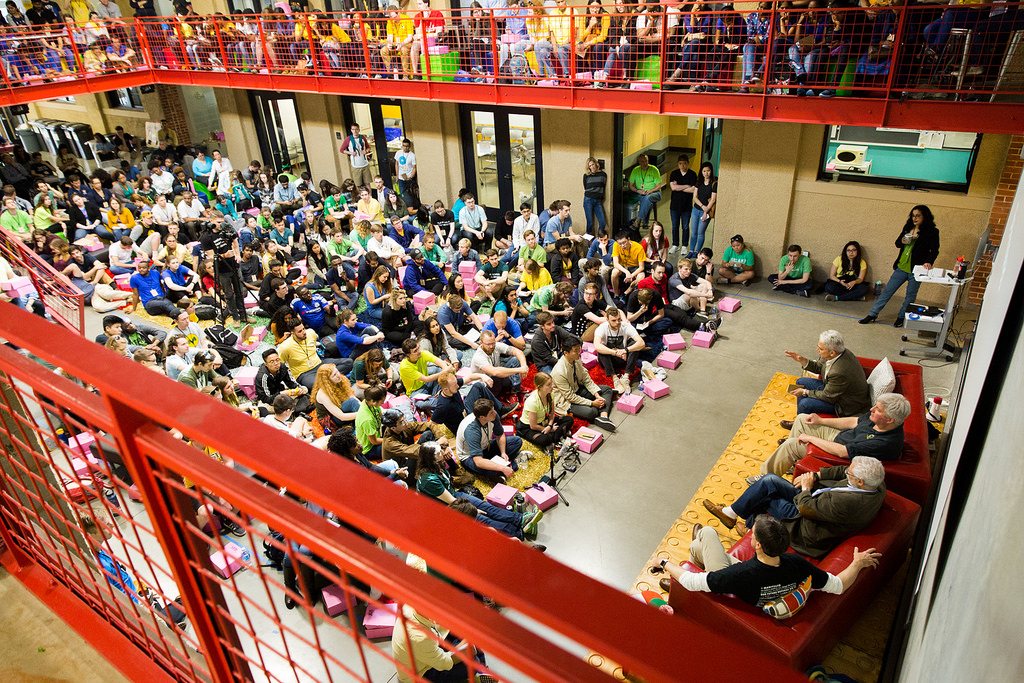
Tom Byers hosts a panel discussion at Stanford’s d.school with Steve Blank, Errol Arkilic and Tom Kalil. Photo by Patrick Beaudouin.
Another speaker at the event was Daniel Seddiqui, known for his journey of working 50 Jobs in 50 States when he struggled to find a job after college. Seddiqui shared his wildly entertaining story with Fellows about his “job prototyping” experience, which included roles like a stilt walker at an amusement park in Florida and a coal miner in West Virginia. He encouraged Fellows to find the drive within themselves to overcome the challenges and rejections that they will face as they explore the world.
On Sunday, the Fellows visited Microsoft, where they were hosted by Jeff Ramos, manager of The Microsoft Garage, a project division that helps Microsoft employees solve problems in innovative ways. Innovators at Microsoft shared their insights on how to shift culture within an institutional setting and urged Fellows to push themselves out of their comfort zone to pursue different experiences.
Following the talks, Fellows took part in an unconference, during which Fellows set the agenda and organized around topics of interest. The topics ranged from “How might we create and promote diversity and inclusive excellence on our college campuses?” to “Rethinking freshmen orientation to promote I&E [innovation and entrepreneurship].” View photos of all the topics and ideas here.
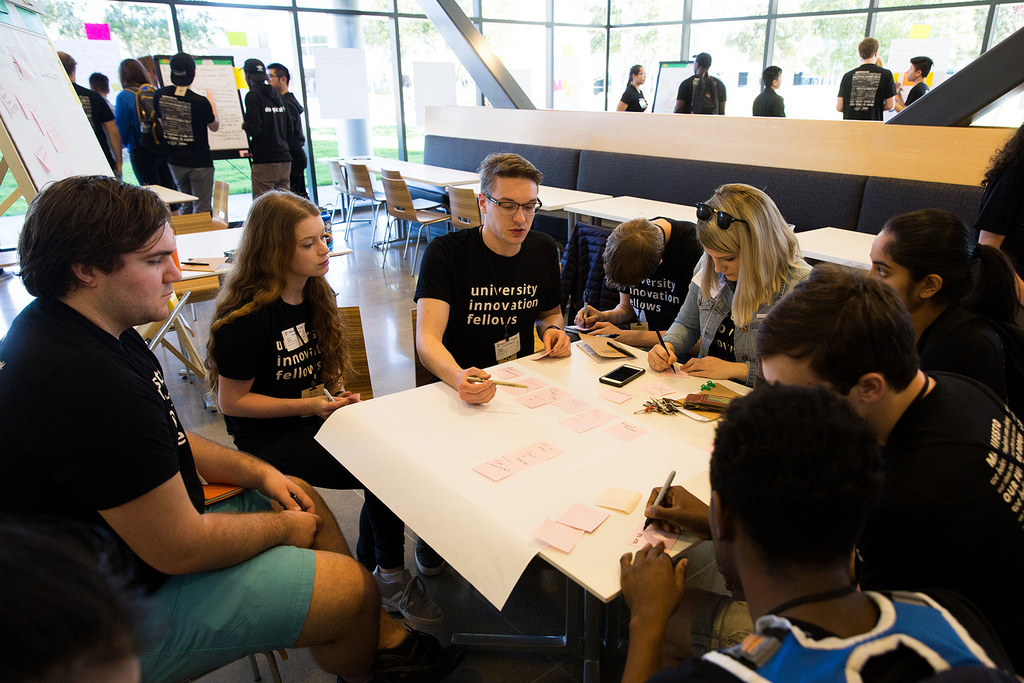
Fellows discuss ideas during an unconference at Microsoft. Photo by Patrick Beaudouin.
The Fellows came back to the d.school for the final stretch of the event — an exploration on leading change. They were asked to pick a goal and brainstorm quick experiments that would help them test out their ideas. During the workshop, several d.school community members provided inspiration and shared how they applied design thinking to their projects of reimagining philanthropy, tackling homelessness and reforming K-12 education.
After creating their experiments, Fellows heard from Stephanie Santoso, who served as the Senior Advisor for Making at the White House under President Obama. There, she helped develop the Nation of Makers initiative, the first White House Maker Faire and the National Week of Making. Santoso spoke about inclusion and challenged Fellows to spread the experience of the maker movement to communities that lack access.
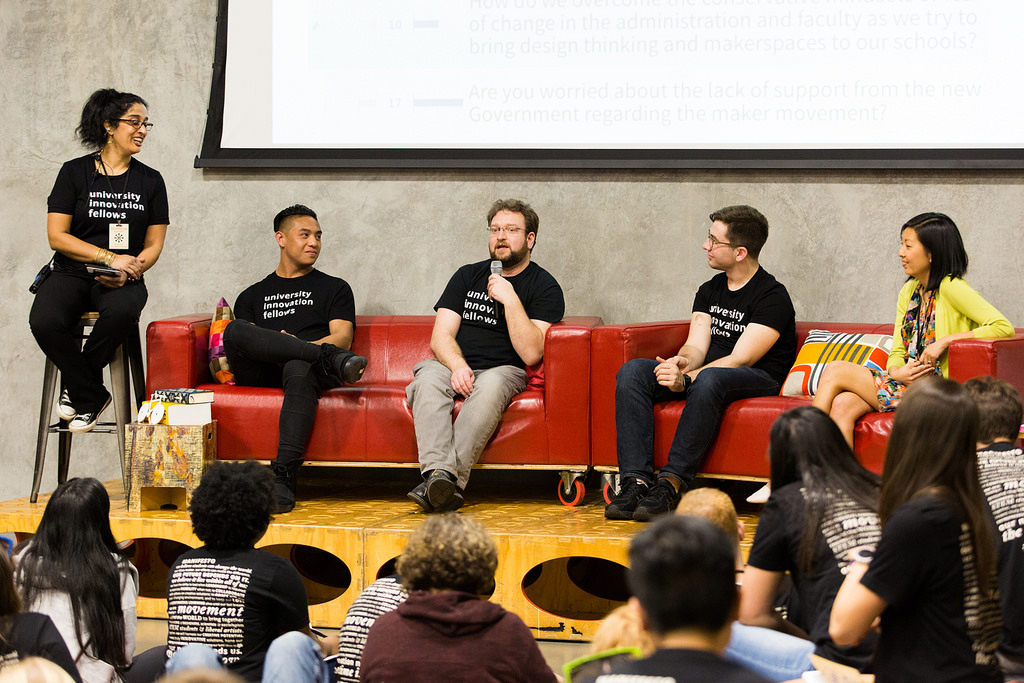
A panel of Fellows discuss makerspaces with Stephanie Santoso (far right). Photo by Patrick Beaudouin.
“Constantly thinking about who else should be at the table, who should we be talking to, whose voice should be represented here is super important,” Santoso said. Her last piece of advice: “Always have fun!…It’s important to remember in the work you’re doing.”
There was one surprise left: a tradition upheld at every Meetup. Participants were each given sheets of colorful paper and asked to write an insight or takeaway from the meetup. They folded the paper into airplanes and launched them into the air. Each person caught an airplane that wasn’t theirs, read it, and shared it with others around them, spreading the insights from one person to many.
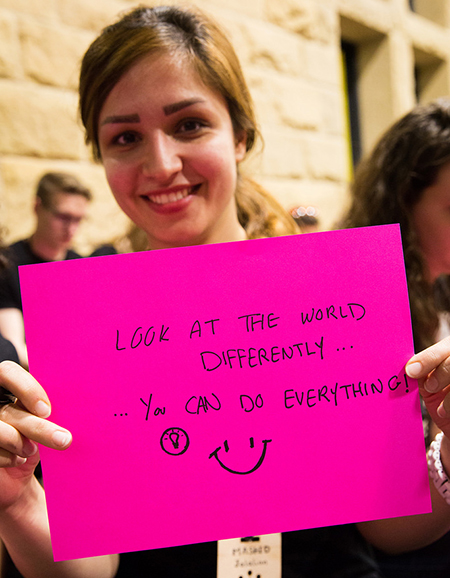
Fellow Mahshid Jalalian shares her takeaway from the Meetup before folding it into a paper airplane. Photo by Patrick Beaudouin.
“Being at the UIF meetup this year was really life-changing. It was empowering to be surrounded by so many people who care about changing the world for the better and are actually taking steps to do that,” said Kelly Rodriguez, a Fellow at Pepperdine University. She tweeted a video of the flurry of paper airplanes, writing “Do you ever have those moments where you just knew you were supposed to be ‘here’? That’s what happened this weekend.”
It’s hard to describe the general feeling in the room as hundreds of people launched their brightly colored paper insights into the open space of the d.school atrium. Some smiled, some laughed, some shielded their eyes from the downpour of paper, some wiped tears from their eyes. But whatever they felt— inspired, tired, excited, sad, hopeful— everyone belonged.
View all photos, videos and resources from the Meetup at universityinnovationfellows.org/materials-march2017-silicon-valley-meetup

